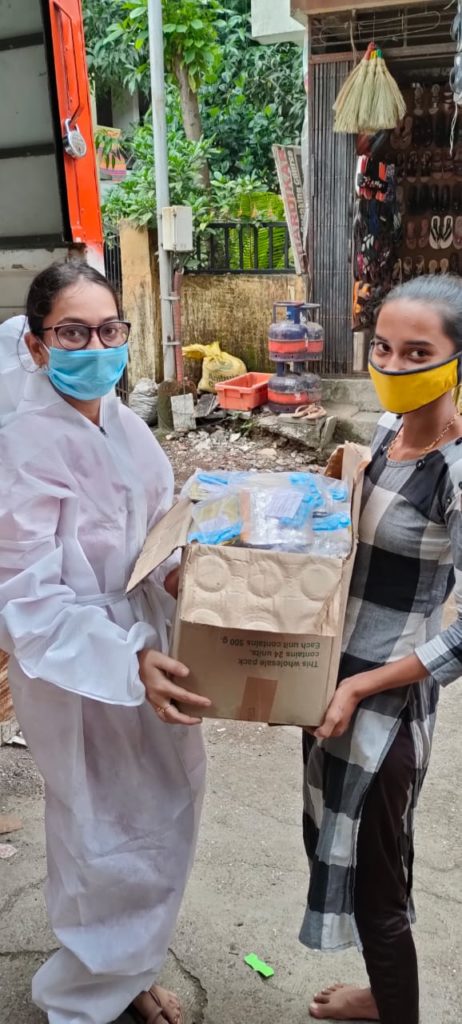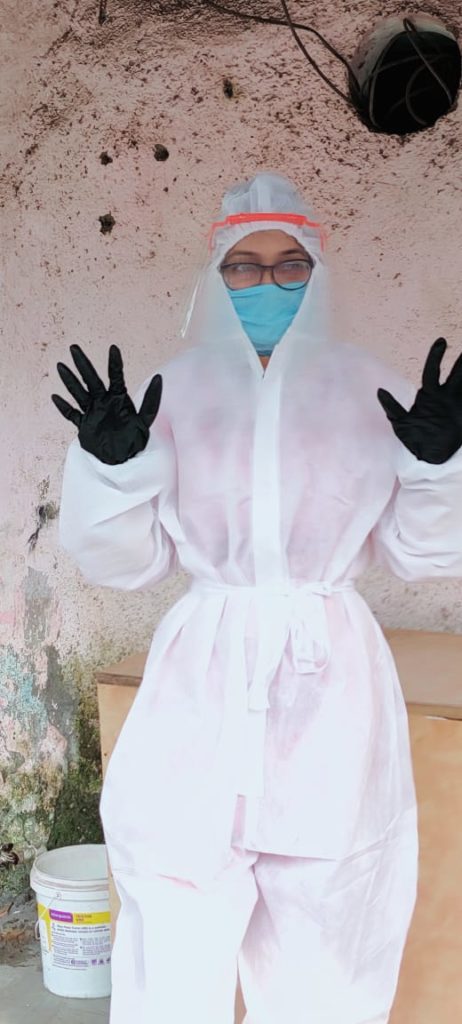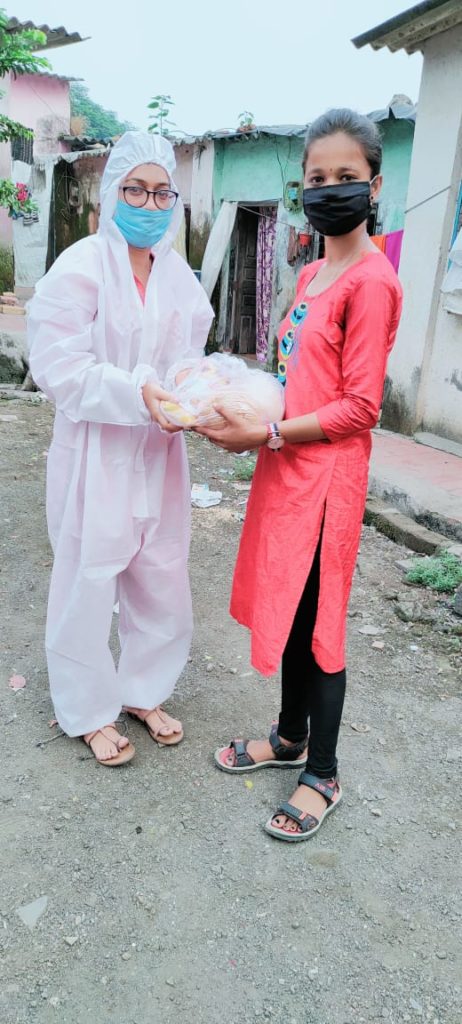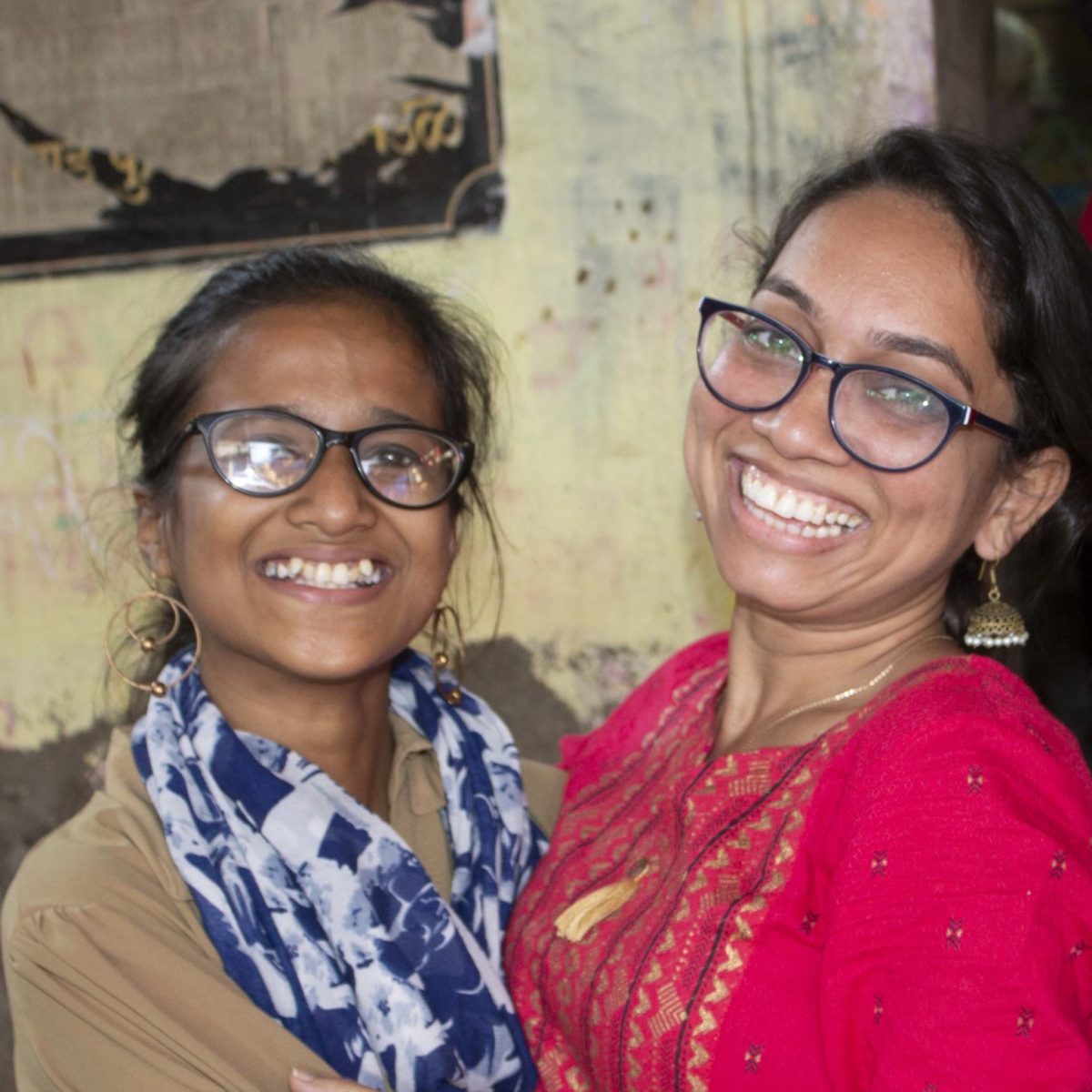
Blog
It takes significant time investment before the communities can trust us and connect with us. This year we have shared so much... They appreciate me. I am their mentor and they expect to hear from me. This is our relationship.
When She Leads: Sonali
November 23, 2020
Reading Time: 13 minutesThis interview is part of our When She Leads: From the Front Lines series. Learn more.
Sonali is a Community Organizer in Sanjay Nagar & Project Coordinator of Shadhika After School Programs for Sanjay Nagar and Shelar communities with our partner site Vacha in Maharashtra. Sonali was interviewed by Program Officer Kendra Nicolai and Donor & Program Associate Sabah Siddiqui.
Trigger Warning: This interview discusses suicidal ideation.
Press play to hear Sonali’s introduction.
What has girl leadership looked like during a pandemic up to this point?
The last eight months have been very critical and stressful for our girls. Every girl is a leader. When the pandemic started, they didn’t know how they would study or take classes online. In India, online school is not the first preference for anyone. It is very confusing, there is no guidance; the girls kept asking, “How do we prepare for our exams, how do we study?” For the first two months they struggled with their online lectures. Some don’t have proper mobile phones, enough mobile data available for their lectures, and the timing of lectures were also difficult to work around other home life responsibilities and expectations.
We brainstormed with our students and suggested that maybe some of the girls could share mobile phones with each other. If two girls are in the same course, then one day they would use one girl’s phone and the next day they would use the other girl’s phone to save on mobile data.
At home they are very tired experiencing their parents’ expectations of them. Especially for girls, parents apply a lot of pressure; they expect girls to do all the domestic work. The girls must do these household chores first, and only after that is studying allowed, and then they can participate in Vacha activities. If not in this order, girls are in serious trouble. This is stressful; how can they handle and cope with both situations – the expectations of school and home?
The girls call us [Vacha staff] with all of these problems, and share their feelings. Sometimes they have many feelings and don’t know what to do. One week a girl called and said, “Didi, I want to die.” As staff we are very prepared – but how can we handle these kinds of situations? After that call, we got training from mental health counselors and took webinars on mental health.
How does it feel to get those calls?
When we discussed at our staff meeting, 20-30% of our staff felt prepared for this type of response from the girls. We understand this situation is dangerous. The first time, I called other leaders on staff–Rupali and Yagna. We called the girl and encouraged her to persevere through this situation. At Vacha, the girls can share about their struggles with societal pressure and patriarchy. We share as much support with the girls as we can, by letting them know they are not alone. We encourage them to think positively, to stay connected with things they enjoy like music, art, friends, or their studies – something that makes them happy. Our Vacha peer leaders strongly support these efforts because we cannot do any in-person field work due to the pandemic. During this time they are really stepping up. Peer leaders in their community will come with the girl to the local center and sit down with her. There we can have a video call and communicate together. It’s most important to remind them: “You are strong. Believing in life is huge.” Through one or two conversations, the girls can usually come to understand this.
It is so hard not to be with the girls in-person. After six or seven months, I went to visit the Sanjay Nagar community. During those months I was only calling and speaking on the phone with peer leaders because the COVID situation was not very good there. They all heard I was visiting and one by one the girls came so fast to hug me. In the office we practiced social distance, and only allowed 10 girls at a time because of space. They all wanted to meet with me. One by one we met. Then we got to our work, shifted outside to the garden, and we chatted. It was a very emotional situation, because we could not be close and had not seen each other in so many months.
How else have girls been leaders during this time?
Learning how to handle the online classes was hard but our peer leaders regularly connect with us. The peer leaders let us know they want to have regular calls with us as long as we are working. I talk to 10-15 leaders every day. When I call them they are always with family. When we call a peer leader, it’s for one hour minimum. The mother is typically shouting at her, the brother needs something and he won’t stop talking–there are many distractions.
After the first two months of this, we began several strategies for these calls. We speak in the morning hours of 10-11am or afternoon hours of 4-6pm. During those times, we can talk with each other in confidence. Then peer leaders are able to help us make decisions about their community’s needs. For example, they have helped us distribute rations during the lockdown. If we need to shop vendors for rations, they may go to the shops to gather quotes from vendors and send back to Vacha. The next step is to organize and distribute the rations which can be a very lengthy process. We call up to five peer leaders to come and help. We connect with each other by phone and Internet. Step by step, they understand how to handle this process and situation. It is important to us that the peer leaders have an enjoyable learning experience and that we create a bond, then take steps together.
What have you learned from this experience?
In the beginning I was also very stressed because I didn’t how we would keep or reconnect. Later there was more stress because a girl’s father would take her smart phone for himself to work, so how can I connect with the girls? So, we continue to think of new things. We are handling this with patience, coming up with new strategies as the situation changes. We try to listen first and then react.
What have the young women taught you during this time?
We are all in the same situation, wondering how we can continue coping with this pandemic. After the first two months we really struggled. Then we made decisions. How can we manage our families and work? I also struggle with this situation, but we decide with each other. I’m learning from them, not to panic in any situation, to calm down, and take some time for yourself. Think, and most importantly, breathe. Last year we took a workshop on self-defense. During that class, the instructor gave some tips about breathing. If you are in a critical situation before you do anything, you want to take a long, deep breath. The girls remember this, and remind me of that moment. They say: “Didi, don’t panic, breathe, calm down, breathe.”
What does it mean for you to lead in this moment? How has this been for you?
It means a lot to lead right now. For the last two and a half years, I have worked in-person with all these girls. Every “Community in Charge” [1] has problems connecting with new girls. The Mumbai communities Vacha works in are very specific, and they want specific things from us. It takes significant time investment before the communities can trust us and connect with us. Most often I feel it is at least after one year spent with each other, that they accept me as a mentor and teacher.
This year we have shared so much, even I have shared personal things with them. I am happy that they are implementing what I have taught them. If I don’t call the girls, they are upset with me. They appreciate me. I am their mentor and they expect to hear from me. This is our relationship. Last week was my birthday, and they put my photo on social media and wrote such nice notes like, “You are my support system, you are my inspiration, you are like my big sister.” That is more than I ever expected.
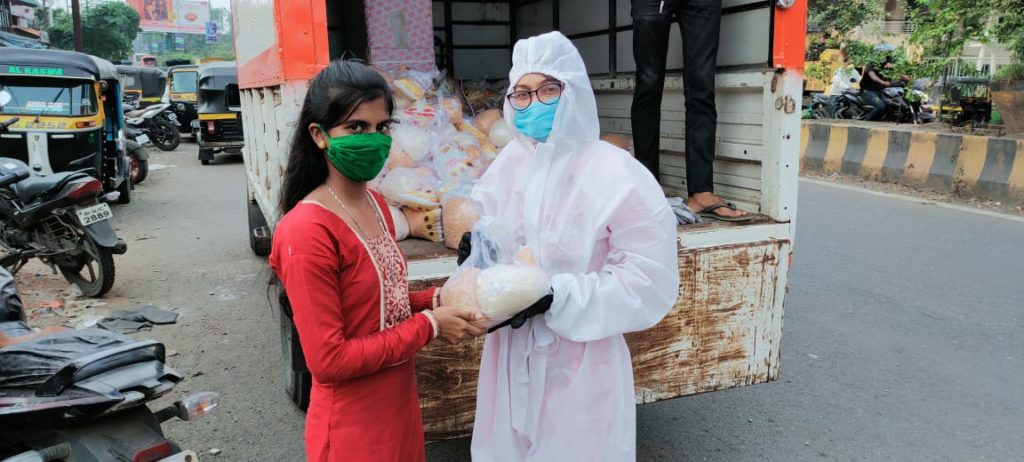
What do you and your community expect for the upcoming year?
We work with girls and their parents through afterschool programs in these two communities, but we don’t have more capacity to empower their leadership in other ways.
It’s not just about calling and talking to the girls. Apart from that, I teach and lead them, to help them step out of their comfort zone and understand new things. Visiting them makes the space where we will provide training and talk with them. During the pandemic it is not possible to do site visits, but in-person trainings and visits are needed to help girls be more comfortable to share and be open with staff. We are also facing fundraising challenges.
I personally think our girls leaders need more direct training, like a full day of sessions to bring their leadership skills forward. In our center we currently don’t have space to conduct workshops like this for more than two hours. This is not enough time. When we are speaking on the phone with the girls, there are restrictions. Either because of their parents, their siblings, local boys, they are often at home or in community settings where it is unsafe to talk. Moving into 2021, we want to change this.
Currently, we are conducting virtual webinars for the girls, with creative and informative topics. However, it can be difficult to know if the girls will be allowed to participate if they are required to do house chores or if they don’t have strong enough network. In the last four months, 85% of our students attended their online Vacha sessions in both Shelar and Sanjay Nagar communities. Time management is a struggle but the girls are persistent in their efforts to learn.
There are risks involved with girls raising their voice and being leaders in their communities. What are they?
Yes, most of the time, especially when girls know their rights and they are talking about their rights with their family. I know most of the families don’t like it and are annoyed. They will push back and say, “Don’t go to Vacha. At Vacha you are going places that are not safe for girls.” As girls learn their rights, they start asking questions in the family. Then, later on, maybe a girl takes up a peer leadership role with Vacha for a safety initiative to improve community street lights and begins speaking with community leaders and developers regularly. Parents and neighbors see these things. In the home and in our society, many will speak negatively about a girl who behaves this way.
Sometimes it’s in her character also. For example, a girl wears Punjabi kurtas in her home community but when she leaves that area, she sees other fashions and different ways of dressing. When she talks, there are new words. Then she connects with new and different friends. All those things can impact family and community – and not everyone will appreciate the changes. Many will see these things negatively and pretend that she is a careless type of girl. Sometimes they are physically abusive when this happens.
When does the parent’s mind shift?
In every situation, in every new thing, we have to spend time and be patient with change. We take time and build relationships. Change will come. Girls also take time to change. When girls come to Vacha they also think like the patriarchy. They often agree with their parents and others who want to keep them from becoming something more. But they also want support from others. When we consistently talk with parents, when we give feedback, or when a peer leader takes the lead in a meeting with mothers to passionately talk about her dreams and share what she did last year with Vacha. That’s when the parents feel their girl is doing very good job. That’s when the girls get support. Girls want to prove, they need to prove to everyone.
What advice do you have for other women leading from the frontlines?
It’s very simple. You as an empowered woman, become a reference point for each girl you meet. Start by thinking about yourself – you have to do whatever you want to do. Respecting yourself makes all the difference. As an empowered woman you can understand other young women’s struggles and help them in becoming strong.
In India, as a woman, you have to prove to anyone that you are a good mom, wife, daughter—all of the above. Every relationship must be perfect. All women are going through this, think and feel they must prove this. Sometimes, we must let it be. Put yourself first. It is a way towards empowering yourself and girls as well.
[1] Sonali’s official job title at Vacha.
Mental Health Hotlines
Hotlines provide help to those in need. Contact a hotline if you need support for yourself or need help supporting a friend. If you’re concerned about a friend, please encourage the person to contact a hotline as well.
United States Resources
National Suicide Prevention Lifeline
Web: suicidepreventionlifeline.org
Phone: 1 800 273 TALK (8255)
The National Suicide Prevention Lifeline is a United States-based suicide prevention network of over 160 crisis centers that provides 24/7 service via a toll-free hotline with the number 1-800-273-8255. It is available to anyone in suicidal crisis or emotional distress.
Crisis Text Line
Text: “Home” to 741741 to be connected to a Crisis Counselor
India Resources
AASRA
Web: aasra.info
Phone: 91-22-27546669
Phone: 91-22-27546667
Email: aasrahelpline@yahoo.com
AASRA provides a 24/7 help line. You can contact for emotional crisis situations, mental illness issues, and suicidal ideation. Families undergoing trauma after suicide of a loved one are also welcome to seek our help.
KIRAN Hotline – Learn more.
Phone: 1800-599-0019
24/7 toll-free mental health rehabilitation helpline providing first line counseling in response to the increasing mental health needs among people due to the Covid-19 pandemic; 13 languages including Tamil, Hindi, English, Gujarati, Urdu, Assamese, Kannada and Malayalam; providing early screening, first-aid, psychological support, distress management, promoting positive behavior and mental well-being, and psychological crisis management.
Statewide Hotlines – Dial 104, for residents of Karnataka, Tamil Nadu, and Odisha
Additional state-specific hotlines can be found here.
Read more
